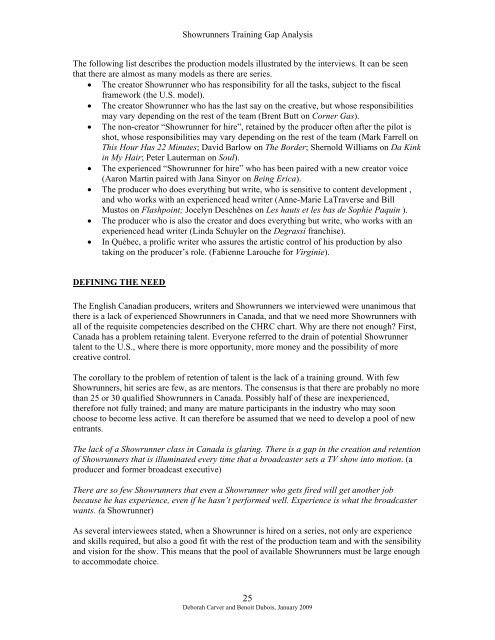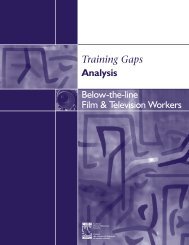Showrunners - Training Gaps Analysis - Cultural Human Resources ...
Showrunners - Training Gaps Analysis - Cultural Human Resources ...
Showrunners - Training Gaps Analysis - Cultural Human Resources ...
You also want an ePaper? Increase the reach of your titles
YUMPU automatically turns print PDFs into web optimized ePapers that Google loves.
<strong>Showrunners</strong> <strong>Training</strong> Gap <strong>Analysis</strong><br />
The following list describes the production models illustrated by the interviews. It can be seen<br />
that there are almost as many models as there are series.<br />
• The creator Showrunner who has responsibility for all the tasks, subject to the fiscal<br />
framework (the U.S. model).<br />
• The creator Showrunner who has the last say on the creative, but whose responsibilities<br />
may vary depending on the rest of the team (Brent Butt on Corner Gas).<br />
• The non-creator “Showrunner for hire”, retained by the producer often after the pilot is<br />
shot, whose responsibilities may vary depending on the rest of the team (Mark Farrell on<br />
This Hour Has 22 Minutes; David Barlow on The Border; Shernold Williams on Da Kink<br />
in My Hair; Peter Lauterman on Soul).<br />
• The experienced “Showrunner for hire” who has been paired with a new creator voice<br />
(Aaron Martin paired with Jana Sinyor on Being Erica).<br />
• The producer who does everything but write, who is sensitive to content development ,<br />
and who works with an experienced head writer (Anne-Marie LaTraverse and Bill<br />
Mustos on Flashpoint; Jocelyn Deschênes on Les hauts et les bas de Sophie Paquin ).<br />
• The producer who is also the creator and does everything but write, who works with an<br />
experienced head writer (Linda Schuyler on the Degrassi franchise).<br />
• In Québec, a prolific writer who assures the artistic control of his production by also<br />
taking on the producer’s role. (Fabienne Larouche for Virginie).<br />
DEFINING THE NEED<br />
The English Canadian producers, writers and <strong>Showrunners</strong> we interviewed were unanimous that<br />
there is a lack of experienced <strong>Showrunners</strong> in Canada, and that we need more <strong>Showrunners</strong> with<br />
all of the requisite competencies described on the CHRC chart. Why are there not enough? First,<br />
Canada has a problem retaining talent. Everyone referred to the drain of potential Showrunner<br />
talent to the U.S., where there is more opportunity, more money and the possibility of more<br />
creative control.<br />
The corollary to the problem of retention of talent is the lack of a training ground. With few<br />
<strong>Showrunners</strong>, hit series are few, as are mentors. The consensus is that there are probably no more<br />
than 25 or 30 qualified <strong>Showrunners</strong> in Canada. Possibly half of these are inexperienced,<br />
therefore not fully trained; and many are mature participants in the industry who may soon<br />
choose to become less active. It can therefore be assumed that we need to develop a pool of new<br />
entrants.<br />
The lack of a Showrunner class in Canada is glaring. There is a gap in the creation and retention<br />
of <strong>Showrunners</strong> that is illuminated every time that a broadcaster sets a TV show into motion. (a<br />
producer and former broadcast executive)<br />
There are so few <strong>Showrunners</strong> that even a Showrunner who gets fired will get another job<br />
because he has experience, even if he hasn’t performed well. Experience is what the broadcaster<br />
wants. (a Showrunner)<br />
As several interviewees stated, when a Showrunner is hired on a series, not only are experience<br />
and skills required, but also a good fit with the rest of the production team and with the sensibility<br />
and vision for the show. This means that the pool of available <strong>Showrunners</strong> must be large enough<br />
to accommodate choice.<br />
25<br />
Deborah Carver and Benoit Dubois, January 2009










